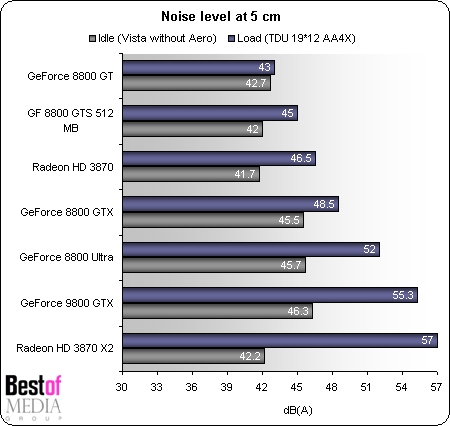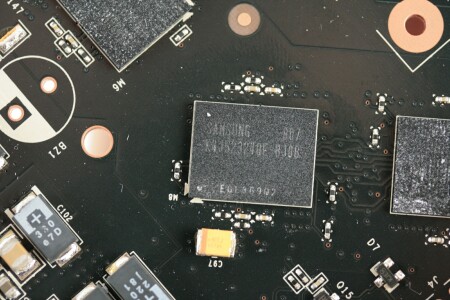Nvidia GeForce 9800 GTX Review
Noise And Overclocking
Here are the values we recorded using our sound-level meter at a distance of 5 cm in front of the card, with all other fans stopped during measurement.
Surprise!? The effective cooling of the GeForce 9800 GTX' G92 GPU comes at the price of a high noise level. While the fan used is the same one as on the 8800 GTS 512 MB, its rotation speed is much higher - at idle as well as under load. Only the HD 3870 X2 took the booby prize for being noisier under load. But it was even quieter at idle - roughly equivalent to the 8800 GTS - which the 9800 GTX should have matched. In practice, its noise wasn't all that bad at idle, but the fan accelerates very fast as soon as you launch a game, and sometimes even when idling, and the noise level becomes frankly obnoxious.
And what's really funny is that Nvidia actually makes a point of saying that this card is extremely quiet, even during gameplay. The marketing department usually simply keeps its mouth shut about a product's negative points, instead of calling attention to them - especially when the fault is this flagrant.
More than likely, the high fan speeds come from the driver, but there's not much chance that Nvidia will make any change. The high level of cooling is probably necessary in order to make sure that a maximum number of GPUs will stand up to the 9800 GTX' high frequencies.
Overclocking
We were able to push the GPU's clock speeds of 1688 MHz (for the stream processors) and 675 MHz (for the rest of the GPU) to 1998 MHz and 810 MHz, respectively - by approximately 19%. That's an impressive gain for the G92, which has the highest factory frequency and all of whose units are used, and it's undoubtedly the result of the card's effective cooling. Our 8800 GTS 512 MB topped out a little lower, at 776 MHz.
As for the memory, we were able to go from 1100 MHz to 1252 MHz, for the expected gain of 14%. The resulting increase in fluidity with Quake Wars at 1920x1200 and 4x antialiasing was 16% - which was more than reasonable for this high-end card (though Nvidia probably has enough elbow room to create a hypothetical GeForce 9800 Ultra).
Get Tom's Hardware's best news and in-depth reviews, straight to your inbox.
Current page: Noise And Overclocking
Prev Page Power Consumption And Temperature Next Page Conclusions-
BPT747 Interesting results, I have found several card makers (Palit, Asus, Evga, and Zotac) that make a 1GB 8800GT(S). Since you were speaking of the memory limitations of the 9800GTX, I am curious how these cards would preform with the 8800 driver optimizations you mentioned.Reply -
Spectere I purchased a GF9800GTX not long after it came out and the only time I recall hearing the fan spin up to high (which is fairly loud) is when the card first initialized itself when I turn my system on. I've logged many hours of game time on this rig and haven't heard it spin up at all. I'm using the ForceWare 174.74 drivers and an XFX branded card (if that would make any difference at all...probably not).Reply -
teamjawbox Would an Intel Core 2 Duo Dual Core E6600 (2.4ghz) 1066FSB processor bottleneck the 9800GTX? Trying to decide whether to get one or not and dont want to get it and not see an increase in performance due to my processor. Thanks!Reply -
TiberiumSoldier i am going to buy an intel Core 2 Duo E8500 with ASUS or XFX or eVGA 9800gtx and 2gb Corsair Dominator ram.. is this a good option??? or i should buy an AMD Phenom 9600?Reply

